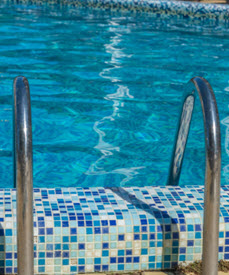As the mercury dips slightly and the Sunshine State becomes a little less sunny, many people look for indoor heated swimming pools. These facilities may not be the most family-friendly places, because unintentional drownings are the leading cause of accidental death for children under four.
Indoor heated swimming pools may be even more hazardous than outdoor unheated swimming pools. Typically, neither of these facilities have lifeguards on duty. Moreover, warm water encourages more bacteria growth. That means even more harsh chemicals, like chlorine, are in warm water. Finally, many heated pools have stronger-then-normal drains. Even a slight undercurrent can throw off young swimmers and cause them to panic.
Damages in a swimming pool drowning claim are usually substantial. Even a few minutes under the water can cause a permanent brain injury. When it is deprived of oxygen, the brain starts shutting down bodily functions one at a time. The longer the victim is under the water, the more bodily functions are lost. And in these instances, time is measured in seconds instead of minutes or hours.
Liability in Swimming Pool Injury Cases
Under Florida law, most of these injury victims are either invitees or trespassers. An invitee is an invited guest who produces an economic or noneconomic benefit for the owner. That benefit could be the money that a hotel makes from renting rooms or the benefit of social interaction at a party. In these cases, owners have a duty of reasonable care, which is one of the highest duties in the law.
Normally, owners own no duty whatsoever to trespassers (no permission and no benefit). But child trespassers usually involve the attractive nuisance exception. If the place is somewhere that children are likely to play, the risk of serious injury is significant, and it is relatively easy to keep children out, owners have a duty of reasonable care. Arguably, swimming pools meet all three of these criteria.
Privately-owned heated pools must meet or exceed the standards set forth in the Florida Residential Swimming Pool Safety Act. Some of this law’s key provisions include:
- A fence or other barrier which completely surrounds the pool and is at least four feet tall,
- Approved safety pool cover, and
- Self-latching gate that’s operated from the pool side.
Florida Statutes Section 514.0315 establishes the standard of care for public swimming pools. These facilities must also have a number of safety features, including:
- Safety vacuum release,
- Gravity drain system,
- Nearby lifesaving equipment, and
- Automatic pump shut-off.
Special rules may apply to swimming pools that were built before 1993. However, if the pool has been substantially renovated in the past twenty-five years, the new and more restrictive rules probably apply.
In both public and private pool injuries, if a failure to observe safety precautions actually and proximately caused the injury, and the owner knew or should have known about the defect, the owner is liable for damages.
The Assumption of the Risk Defense
Signs like “Swim At Your Own Risk” and “No Lifeguard On Duty” do not automatically immunize landowners. Instead, they may give rise to the assumption of the risk defense. This doctrine applies if the victim:
- Voluntarily Assumes: The victim must be able to see the sign, read it, and understand it. The insurance company has the burden of proof on each of these points.
- A Known Risk: If an unskilled swimmer goes to the deep end with no floatation device, there is clearly a known risk. But hidden dangers like high chlorine levels or malfunctioning drains are usually not known risks.
If the assumption of the risk defense applies, the landowner is generally not liable for damages.
Count on Experienced Attorneys
Cooler weather increases the chances of swimming pool injuries. For a free consultation with an experienced personal injury lawyer in Brandon, contact Reed & Reed. We have four area offices (St. Petersburg, Lakeland, Tampa, and Clearwater).
Resource:
cpsc.gov/Latest-Pool-Safely-Stats-At-Least-163-Children-Fatally-Drowned-in-Pools-and-Spas-This-Summer

